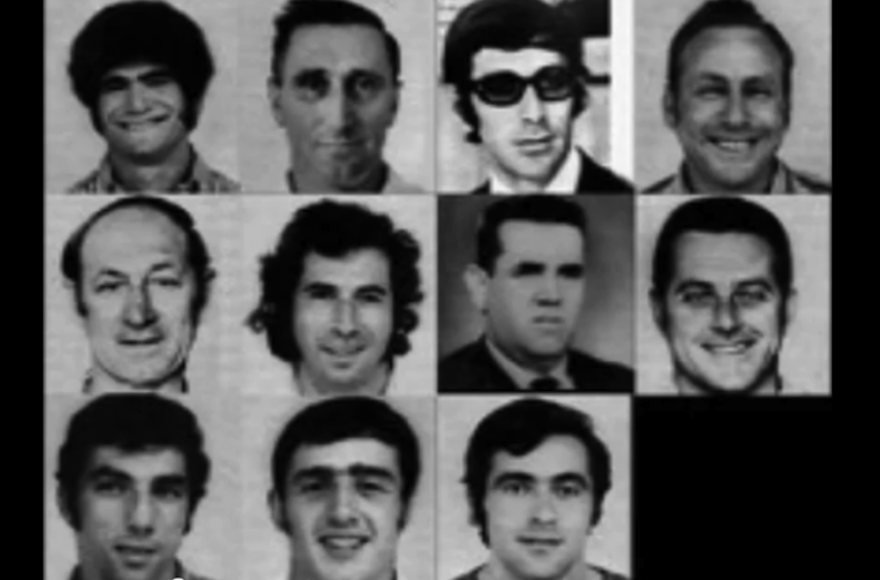Esther Roth will never forget the Olympic Games of 1972. They were both the highlight of her youthful athletic career and — as they became a venue for terrorism — the most horrible moment.
“My coach was very happy because I had my best results for him. It was like a dream,” said Roth, a former hurdle jumper who is currently in Munich to cheer on Israel’s team in the European athletic championships. She spoke to the JTA by phone last week from Munich’s Olympic Stadium.
Roth’s coach, Amitzur Shapira, was one of 11 Israeli athletes killed by Palestinian terrorists during the Olympic Games in Munich on Sept. 7, 1972.
“Being around here makes me remember everything that happened 30 years ago,” she said. “Some pictures you cannot forget. Some pictures are still with you for 30 years.”
On Sunday, Roth joined 23 family members of the murdered athletes in a ceremony at a memorial near the stadium. Israeli Ambassador to Germany Shimon Stein and representatives of the local Jewish community attended the event, which was organized by the Israeli Light Athletics Association together with its European counterpart.
Together, they recalled the day when Israeli athletes were taken hostage by members of the Palestinian Black September guerrilla group. The terrorists killed their hostages during a botched rescue attempt by German police at the Furstenfeldbruck military airport.
During the one-hour ceremony, a large stone tablet was placed at the bridge linking the former Olympic village to the Olympic stadium. An Israeli flag was draped across the tablet.
This week, for the first time since 1972, Israeli athletes are living in the same complex in which the hostages were taken. But much more security is provided now, Roth said.
“The world now is not the same as it was 30 years ago,” said Roth, who also attended a small remembrance ceremony Aug. 5 at a memorial near the stadium. “Everything is security, security, security. Not because of us. After what happened on Sept. 11 in the United States, the world has changed. You cannot go free all the time.”
The Israeli team leader turned down an offer to house his team in alternative accommodations away from the former Olympic village.
Jack Cohen, who is general secretary of the Israeli Light Athletics Association, said he did not want any special treatment for the Israeli team.
“We are like any other team, pleased to be here,” said Cohen, who as a 12-year-old watched the 1972 Games on television in Tel Aviv.
“Of course remembrance is important,” he said. “That is one reason why we are here also: To show that we are here again and we are continuing what was stopped 30 years ago. It is very exciting.”
Some of the young Israeli athletes clearly felt connected to the events of 1972, though they were born long afterward. Long-distance runner Nili Avramski ran her races with the number “72” written on one hand and “11” on the other.
Ankie Spitzer, widow of fencing trainer Andre Spitzer, chose not to attend Sunday’s ceremony. Spitzer, now a spokesperson for the families of the murdered athletes, reportedly has been struggling for two decades to win compensation from Germany. The compensation claims are based on Germany’s poor security at the Olympic village and the bungled rescue attempt.
There was no investigation of the events until 1992, when files were smuggled from Germany to Israel. Since then, the city of Munich, the state of Bavaria and the German federal government have offered about $3 million to the families of the athletes, a belated and indirect admission of partial responsibility.
For Roth, the present and future are just as important as remembering the past. Despite the fact that the Israeli team was “not having much success” at the games, she was cheering them to the last.
Perhaps her cheering paid off. On Saturday, the Israeli team achieved some success when Alex Averbukh earned a gold medal in the pole vault.
Shoshana Shapira, the widow of her coach, is accompanying Roth in Germany. Roth is also with her daughter, Michal, 20, who is in Germany for the first time.
Michal “cannot understand how I could get over my memories to come here again,” Roth said. But she is “most excited to see the Israelis play here. And that really makes me feel good.”
JTA has documented Jewish history in real-time for over a century. Keep our journalism strong by joining us in supporting independent, award-winning reporting.
The Archive of the Jewish Telegraphic Agency includes articles published from 1923 to 2008. Archive stories reflect the journalistic standards and practices of the time they were published.




